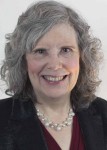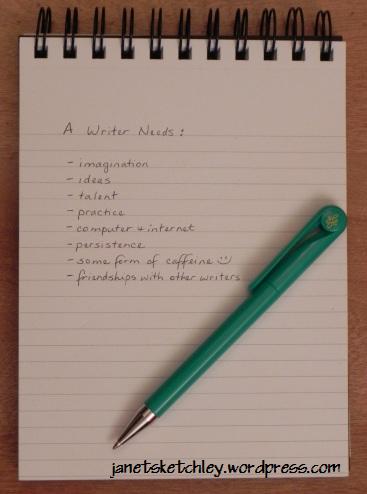Last Friday we began an interview with N.J. Lindquist and Wendy Elaine Nelles, the co-editors of A Second Cup of Hot Apple Cider. [If you missed it, here’s part one.] Here’s where we left off:
Janet: I’m not sure where you found time to write, but you each contributed a piece for the anthology as well. Was it difficult editing one another’s work without that second, impartial editor?
 NJL: We tried to get at least a first draft done before the submissions deadline because we knew how swamped we’d be after that. I actually tried writing about four other short stories before I hit on the one that we used in the book.
NJL: We tried to get at least a first draft done before the submissions deadline because we knew how swamped we’d be after that. I actually tried writing about four other short stories before I hit on the one that we used in the book.
I have two terrific concept/substantive editors who live close-by, so they always read my work first anyway. (My #2 son and my husband, in case you’re wondering.) They give me very honest and often annoying feedback. So I don’t think editing our own pieces was a huge problem. I think I was as tough on Wendy as I’d been on everyone else.
The real problem was that we kept leaving our own pieces to the last to edit, which wasn’t good.
 WEN: Yes, we were tough on each other’s pieces too, and we went through a number of revisions just like everyone else. But it was hard slogging because we were completely exhausted by the time we focused on finishing our own pieces at the end.
WEN: Yes, we were tough on each other’s pieces too, and we went through a number of revisions just like everyone else. But it was hard slogging because we were completely exhausted by the time we focused on finishing our own pieces at the end.
I deliberately chose to write someone else’s story, because I think too often writers who are Christian focus only on their own experiences when many other people have wonderful stories others would benefit by reading. But writing a 3,500 word human interest profile is a huge amount of work, because you have to get to know the people, do lengthy interviews, ask the right questions, transcribe everything that was said, organize the material, condense it all, focus on the story aspects, get the answers to any missing details, retain the other persons’ voices… and make sure that you have represented them fairly, accurately and compellingly.
Janet: Contributors had to be Canadian who are Christian (as defined by their acceptance of the Apostles’ Creed). They also had to be members of The Word Guild. What collective benefit does this bring to contributors and to TWG?
NJL: If I’m going to invest my time in someone, I want it to be for a person who understands the value of being part of a team. So working only with members of The Word Guild seemed logical to me. No, just becoming a member by paying one’s dues doesn’t guarantee the person won’t just get what he or she wants and then leave, but it’s a start.
Also, The Word Guild is promoting the book, so it’s only logical to prefer that the writers in the book be members.
WEN: I think that people don’t always understand that both the Hot Apple Cider books were created to benefit ALL members of The Word Guild, whether or not they were chosen to be in the books. We’re modeling what it means—and the amount of work it takes—to produce an excellent product that can stand shoulder-to-shoulder with any other book on the market. We’re modeling working together as a team, to the benefit of enhancing everyone’s career. We’re increasing the public profile of all Canadian writers who are Christian, and everyone who’s in The Word Guild.
I like using the analogy “a rising tide lifts all boats.” We are working hard to enlarge the market and strengthen the publishing community for all Canadian writers who are Christian.
Janet: The Word Guild raised the money to pre-purchase 30,000 copies of A Second Cup of Hot Apple Cider to donate to World Vision for their Girls’ Night Out and Couples’ Night Out programs. This happened with the first book too, so obviously it’s considered a win-win deal. What are the key benefits to TWG?
NJL: When we began The Word Guild, there were certain “givens” in terms of the book publishing industry in Canada.
A. Few people (including staff in Christian bookstores) were even aware there were Canadian writers who were Christian.
B. Since there was virtually no publishing in Canada, you pretty well had to get published in the United States, and the fact that you were Canadian was rarely mentioned, even in Canada.
C. There was a stigma that Christian books published in Canada weren’t very good, since most of them were self-published.
So the benefits to The Word Guild are the ability to get a lot of Canadian writers’ work in one book, you have clearly Canadian content, and you have a terrific book published in Canada. And an extra 30,000 copies are being given out across the country.
WEN: To this day, many people—including staff in Christian bookstores or church librarians—may be surprised to hear that authors published in the U.S. such as Janette Oke or Mark Buchanan are Canadians. Yet today, I’d estimate at least 95% of the product in Canadian Christian bookstores is American. The Word Guild has done a lot in the last 10 years to change public perceptions, but we’ve to a lot more to do.
 Yes, the Hot Apple Cider books are a win/win situation for everyone. The writers help the humanitarian ministry of World Vision. World Vision gets a valuable gift to distribute at its events. The writers get their work directly into the hands of 30,000 potential buyers. Attendees are excited to receive a gift, and become aware that Canadian writers are worth reading. They hopefully become more interested in seeking out Canadian writers, so they can read stories relating to their own country, their own culture, their own history, their own neighbours.
Yes, the Hot Apple Cider books are a win/win situation for everyone. The writers help the humanitarian ministry of World Vision. World Vision gets a valuable gift to distribute at its events. The writers get their work directly into the hands of 30,000 potential buyers. Attendees are excited to receive a gift, and become aware that Canadian writers are worth reading. They hopefully become more interested in seeking out Canadian writers, so they can read stories relating to their own country, their own culture, their own history, their own neighbours.
Janet: The quieter member of the That’s Life Communications publishing team is Les Lindquist, who’s been assessing the changing trends of publishing and handling contracts and other details.
NJL: Without Les, there would be no organization called The Word Guild, no publishing of Hot Apple Cider, nada.
Janet: I’m thankful to be a contributor to A Second Cup of Hot Apple Cider, and have enjoyed reading everyone else’s stories. The anthology has the same restful artwork as the first volume, and it’s a delightful gift book as well as one to keep at home. Dare I ask if there’ll be a volume three?
NJL: We hope so.
WEN: Some experts say that writing a good book is just 10 percent of the work, promoting it effectively is the other 90%. So although we’ve made history by holding over 150 promotional events in seven provinces since the book was released, we’ve only scratched the surface of what could be done to make more people aware of this great book. Helping A Second Cup reach its potential and its audience is the focus for now. But building on everything we’ve done to expand the series would be great.
Janet: With the intensive editing behind you, what projects are you working on now?
NJL: I basically stopped writing close to ten years ago when I began the process that ended up in the founding of The Word Guild. I feel that A Second Cup of Hot Apple Cider is a fitting finale for my years of involvement in virtually every aspect of The Word Guild. It meets our initial mandate of having a team of people working together, helping people develop their skills, and working together in marketing and promotion.
I have about 24 books I’ve begun in the past, and I want to get busy on finishing some of them. High on my priority list is the third of my Manziuk and Ryan mysteries, and then I have a fantasy I need to figure out what to do with, and some other novels and non-fiction, including a memoir. I have lots to keep me busy.
WEN: I have lots to keep me busy too. Like N. J., my energies were completely used in writing and editing related to The Word Guild or Hot Apple Cider books in recent years, with time for just a few freelance articles. I’m working on developing several non-fiction books I’ve envisioned, as well as using my experience to produce some e-books and webinars geared to teaching writing.
Janet: I look forward to what we’ll see from you both in the future. The Lord continue to equip and bless you, and to accomplish great things through you.
Like this:
Like Loading...
 Write Canada is online this year, happening on October 21, 2017, with tracks for fiction and marketing.
Write Canada is online this year, happening on October 21, 2017, with tracks for fiction and marketing.







